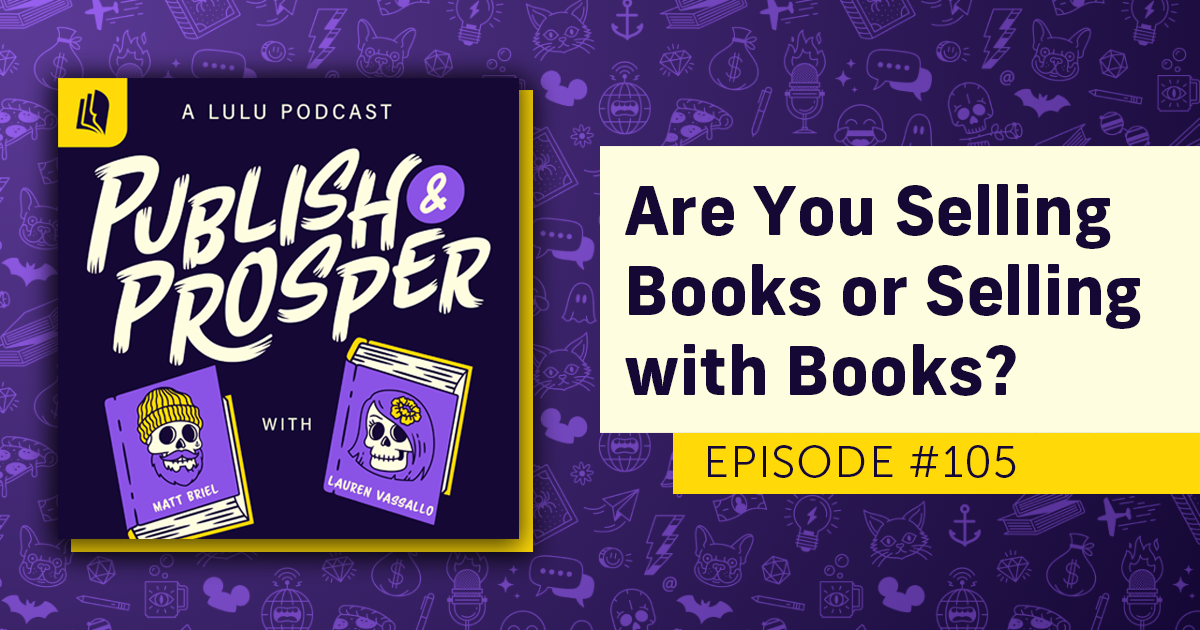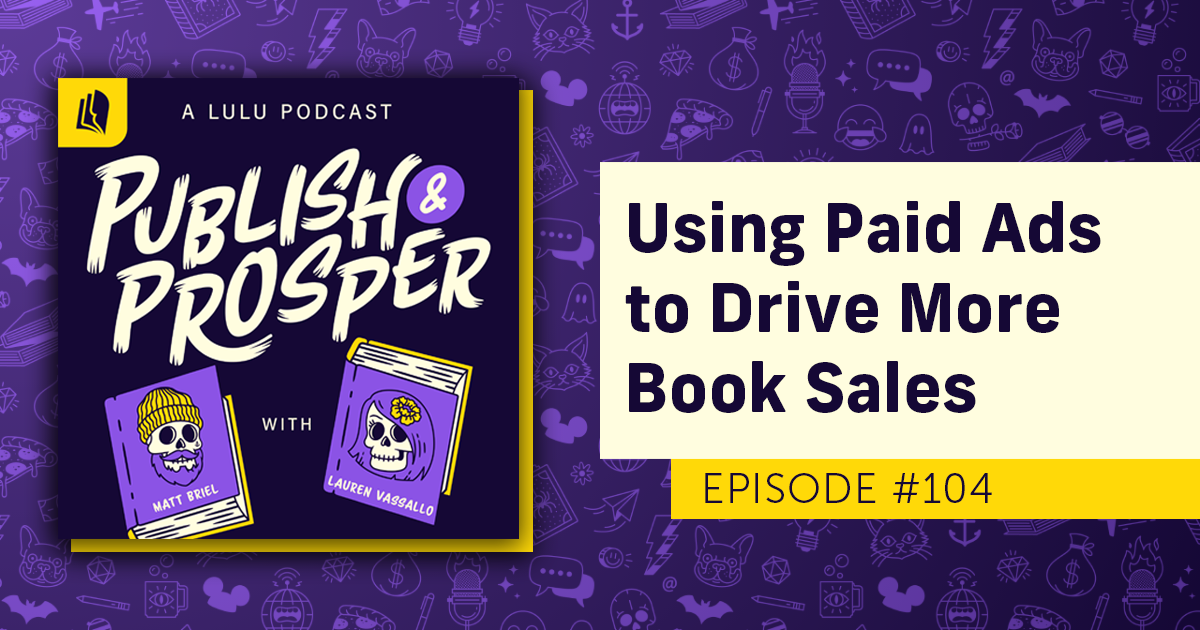Standing Out From the Crowd: Discoverability
Like many things in the modern age, discoverability’s definition has evolved. Historically, discoverability meant “the quality of being able to be discovered or found.” But online, the meaning is more specific: discoverability is a measure of how easily you, your brand, and your content are found through a search or on a website.
How easily discovered your book is online will directly impact how many people look at that book and ultimately buy from you. There is no shortage of content already on the web about discoverability (this Google search as evidence), but today we will look at 4 ways you can help make your book more discoverable.
It’s not enough to simply write a great book. Not if you hope to sell copies of that book. If you look through the archives here, you’ll find many a Lulu blog laying out plans and schemes to help you sell more books. Because that’s a big part of why you’re here, right?
What is Discoverability?
Writing for writing’s sake is awesome and we all should do it, but there’s nothing wrong with wanting to make a couple bucks off your book. Or even aspiring to earn a sustainable income from book sales. Lofty goals drive us to be better than we think we can be and that’s always a good thing.
So how do you go about achieving sales goals? Every resource you read, see, or listen to will tell you that writing a great book is the first step. Commercial success with a book is rare, to begin with; commercial success with a bad book is even rarer. You should always start from the ground up with a good book, a well-crafted cover, and thorough editing.
Once you’ve got the book ready to share with the world, the next step is getting the world to notice your amazing book! That’s what discoverability is all about.
And that’s where things get tricky. Email marketing? Selling through bookstores or just online? Amazon or a personal website? Print or ebook?
Overwhelmed yet?

Create Your Book
Use Lulu's free templates to easily create and publish your book today.
Discovery Is the Key
Every single plan and method and idea you have for selling books will turn on whether readers can find your book. And there are readers out there.
For example, NPD Bookscan estimated unit sales in excess of 680 Million in 2017. I could not find definitive numbers on total books published in 2017, but if we assume the high side of the average, we can say that around 1 Million books for the year. That’s an average of 680 book sales per publication—and I’m only looking at the USA figures.
Again, based on Bookscan reporting, we can average around 250 units per year for all books. Take these numbers with a grain of salt, the reporting dates and tracking are not perfect and don’t represent all self-published works.
I list them primarily to give you a sense of the possibilities that are out there. If 680,000,000 books were sold last year, we can pretty safely assume there are interested readers out there.
You have the book. They have the money and the desire to read. Now you just need to connect the dots.
You need to be discoverable.
Standing Out
Just typing out “you need to improve your discoverability” in no way makes it happen. There is no trick or hack that magically draws people to your work. You might find something that temporarily boosts engagement on social media or artificially inflates your email open rates. But this won’t translate into sales and the point here is to get readers, right?
About a year ago I posted an article about using Google and their search algorithms to your advantage. All of that holds today. You need to be making efforts online to build and promote yourself and your author brand so you can stand out in search results. If you haven’t read that post yet, I encourage you to check it out.
Let’s start by assuming you’ve got an author website and you’re working hard to generate content regularly with a blog. You’ve done your keyword research, and you have crafted your online presence in such a way that you’re maximizing each word and post.
The next step is to make certain your book(s) are using a similar scheme.
I’m about to write things you’ve already read and heard and likely are sick of reading and hearing. But they bear repeating because they are just so damn important.
How Do You Make Your Book Discoverable?
Quality Content
Okay, I told you these would be repetitious. Foremost, you need a quality book. You will never write a book everyone universally loves, so let your content be your content. But you can make sure it is grammatically impeccable, cleanly formatted, laid out professionally, and features a well-made cover.
I know this might entail some investment of both time and money, but if you’re serious about making your book a success, you need to be ready to put a lot into it. Today, let’s go 100% DIY for this one. Here are some resources from Lulu to help you create all on your own.
Reviews and Recommendations
Reviews help. Period. You already know this, but it is a point that needs to be driven home. Get some reviews for your book. You would not believe how many published books are on the Lulu bookstore with not a single review.
Let’s be realistic here—you know people who will review your book. Friends and family help to kick off the reviews, other authors in your network, and coworkers. Start by leveraging your connections to build a few reviews.
I wrote an entire piece on the importance of reviews, but what I want to emphasize here is that you need to get them. Whatever strategy you use, you need to have a star rating beside your book to lend your work the credibility it deserves.

Your Free Lulu Account
Create a Lulu Account today to print and publish your book for readers all around the world
Know Your Customers
Where do people who read in your genre congregate online? Are you looking at a Facebook audience or a Goodreads audience? They are two different subsets of readers and might need different marketing styles.
What about locally? Are there reading groups that meet at the library or bookstore? What about writing groups? You need to seek out and join as many of these kinds of groups as you can.
You need to be building a network even before your book is available for sale. Be sure the people already in your network are the first to run out and buy a copy when it releases and the second because you want them to leave positive reviews.
All of this effort comes together to help boost your online presence—both for you the author and for your book. Each review, each mention in a fellow author’s blog, each backlink to your ever-growing catalog of online content; it all adds up.
Remember This Is Self-Publishing
Did you know that most books published by traditional publishers do the bulk of their sales in the first 90 days? It’s true. And after those 90 days, whether the book did well, the publisher will probably move on to the next title on their list.
But this is self-publishing. You are unchained from the rules that govern traditional publishing best practices. There are no rules. With that in mind, you can run an aggressive campaign when your new book releases but continue to promote it gently through social media and email for as long as you want.
These four steps help create a rich trail of data about you and your book. And since you’ve got well-crafted metadata for your book, when someone hears from a friend that “Jimmy’s Rafting Adventure” is an exciting story of adversity in the face of overwhelming odds with beautifully crafted imagery, you can be confident they’ll find your book when they Google the title.
A Caveat
Doing everything I mentioned above, spending hundreds of dollars on editors, designers, and reviewers does not and never will guarantee sales. Period. Don’t let any of those Hybrid Publishers fool you with empty promises either.
But if you put in all this work and you have quality content, you can (most likely) enjoy some sales at the very least. But it will be your book’s discoverability that kicks off most of those sales.
Embedded iFrame
Content Content Content
You know your Search Engine Optimization (SEO) is an important measure of how discoverable you are online, and in turn how discoverable your books are. Rather than diving into a lengthy conversation about SEO as we near the end of this post, I want to touch briefly on some important points.
What matters most here is that you’re building your SEO and, thanks to the optimization of the content you’re already working on, that SEO value will translate into more readers finding you and your content.
SEO Keys for Discoverability
- Keywords – You’ve got keywords related to your content in your book’s metadata and description
- Blog – You’ve got a blog with regularly updated content that also works off your keywords
- Marketing Campaigns – Social media is your friend here and you need to use it to boost the instances of your keywords appearing
There’s more (so much more) to SEO than I could fit into even a single post. What I want to reiterate (since this entire post has been about repeating myself) is that you need a complete and cohesive strategy to help you and your book appear online. This includes:
- Metadata for you, your website, and your book(s)
- Campaigns that boost your presence
- Reviews that create credibility for uncertain readers
- A strong and active network of friends and fellow writers
- Quality content and a professionally crafted cover
Everything is in tandem, like a well-oiled machine, and you’ll have the right pieces in place to make your book stand out among all the others jostling for space online.




